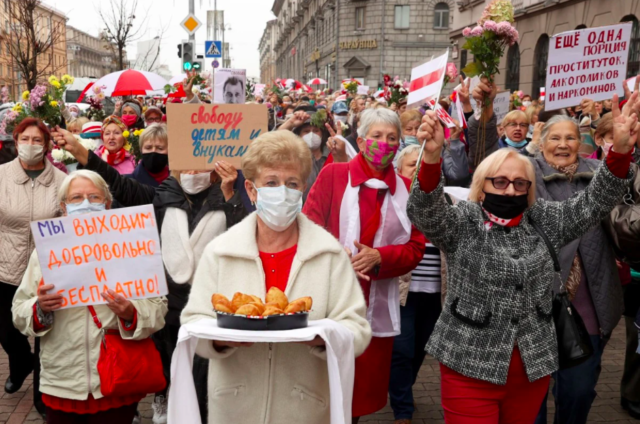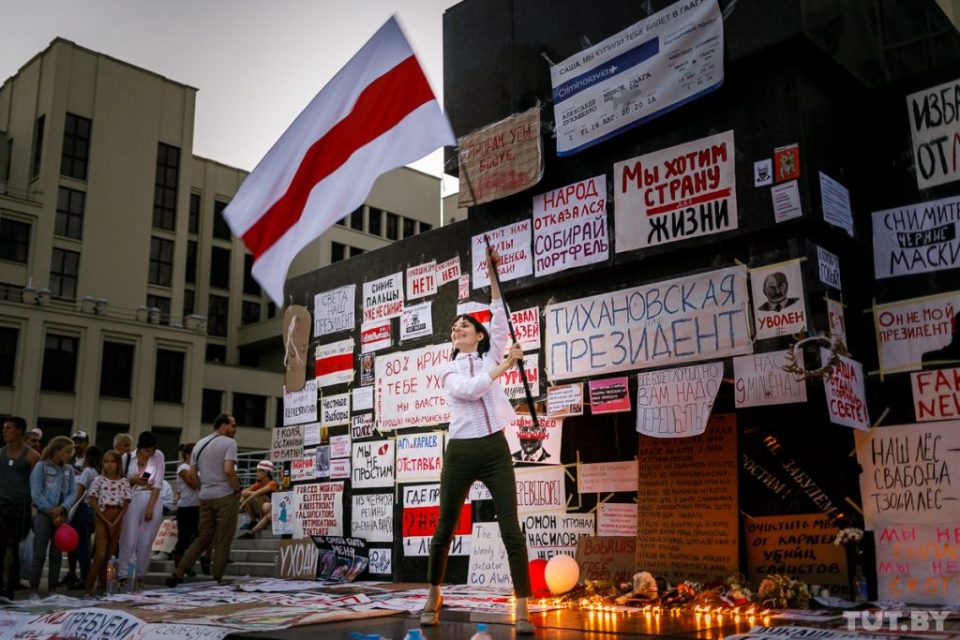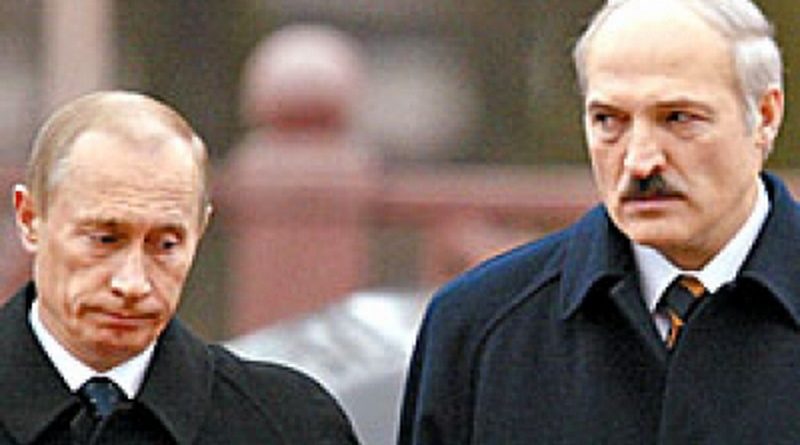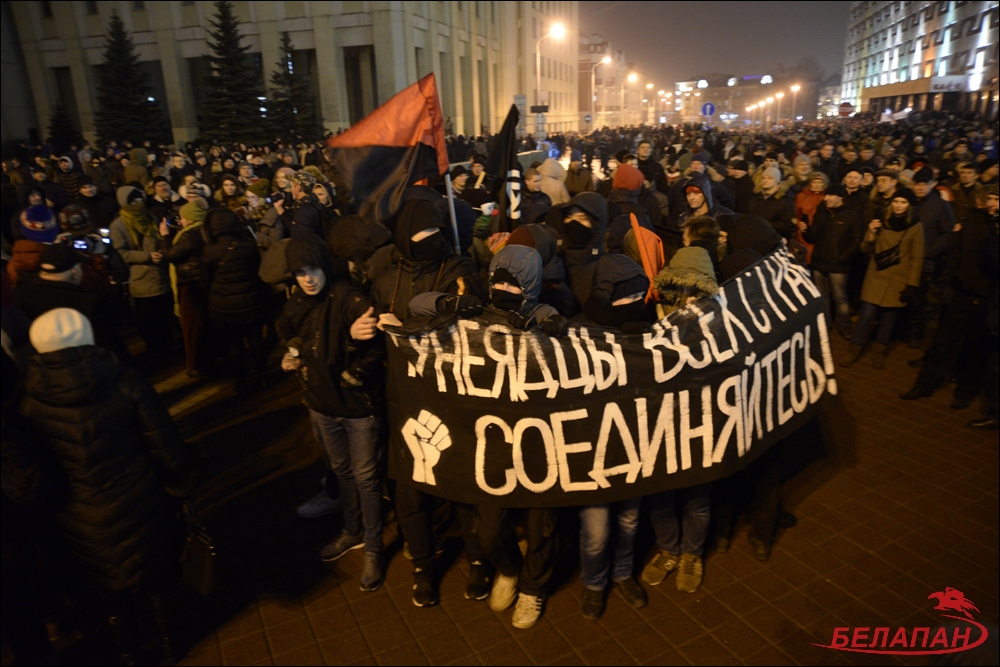Yet because the protests have failed to produce regime change, many Belarusians have jumped to compare their effort with their counterparts’ in Kyrgyzstan.
“Belarusians have been protesting for two months, but the regime has not collapsed. […] The Kyrgyz, on the other hand, disposed of the powers they were fed up with virtually overnight. On social networks, voices sounded: that is who we need to learn from.” An avalanche of speculation followed as to why Belarusians could not match the Kyrgyzstanis, and if this is good or bad (Naviny, October 8).

Most comparisons pointed to oligarchs and the dominance of rival clans in Kyrgyzstan, both of which are largely nonexistent in Belarus (Telegram.org, October 8). But some also mentioned the incredible number of Western-funded non-governmental organizations (NGO) in Kyrgyzstan and the fact that in Belarus, the power vertical has been more consolidated (YouTube, October 8)
While the aforementioned factors surely matter, the very question itself is indicative of a deeper truth. As Belarusian analysts reckoned with explaining two months of fruitless protests, the whole process began to resemble stages of grief. At first, the argument that the protests were failing at regime change (Novaya Gazeta, September 18) incited vociferous denials.
The second stage brought about a discovery that Belarusian society is not as uniform in its desire to remove Lukashenka as perhaps initially seemed. With a scant few notable exceptions (Facebook.com/vbobrovich, October 2), the sympathizers of the protest movement residing in Belarus have largely avoided conceding the above point, lest they be excommunicated by fellow protesters. Thus, the most reputable Belarusian sociologist, Oleg Manaev, who now lives in the United States, took it upon himself to articulate this discovery in a recent interview (Deutsche Welle—Russian service, October 4). As he predicted in the preamble to that interview, he was immediately challenged by quite a few “revolutionary thinkers” (Svaboda, Gazetaby, October 5).
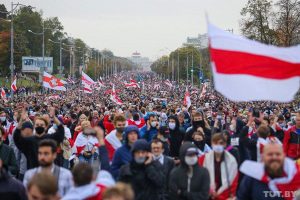
In the meantime, however, that “other Belarus” has shown multiple signs of life. For example, in a major bookstore in Minsk, a well-attended presentation of Aleksey Dziermant’s book Belarus-Eurasia: Borderland of Russia and Europe, expressing ideas in many ways opposite to those of the protest movement, took place (Mlyn, October 8). Also, despite overabundant talk about the ongoing and pending outflow of IT business from Belarus to Ukraine, Lithuania, and Poland, the High-Tech Park in Minsk has reportedly just been joined by 83 new resident companies (Park.by, October 8).
Quite possibly, therefore, the third stage of grief will be associated with the broad realization that, despite its multiple imperfections, Belarus’s social welfare state and its orderliness have earned plenty of public appreciation, not just scorn. Meanwhile, life goes on. In early October, construction concluded on four stations of the Minsk subway’s third line, and work on two more stations is in full swing (Belarus24, October 8). Also, the United Arab Emirates’ Emaar Properties has begun erecting the Minsk Exhibition Center, which will stand on 900 hectares in the northernmost part of the Belarusian capital (Belta, October 5). The building project is the product of efforts by Prime Minister Roman Golovchenko, who earlier served as Belarus’s ambassador to the UAE.
The evolution of the Belarusian socio-political situation echoes a famous pronouncement by the late political scientist Samuel Huntington,
“The most important political distinction among countries concerns not their form of government but their degree of government. The differences between democracy and dictatorship are less than the differences between those countries whose politics embodies […] organization, effectiveness, [and] stability, and those countries whose politics is deficient in these qualities” (Samuel Huntington, Political Order in Changing Societies, 1968, p. 1).
At the same time, the intense international activity by exiled Belarusian opposition leader and 2020 presidential candidate Svetlana Tikhanovskaya, who has already met with the heads of France and Germany, resembles that of 2006 presidential hopeful Alexander Milinkevich, who was also received by Angela Merkel—in March of 2006 (Deutsche Welle—Russian service, March 17, 2006). It is unlikely, however, that the German chancellor still remembers his name. If Tikhanovskaya has a better chance to stay in people’s memory, it will probably be due largely to Lukashenka. The latter made the breaking-news announcement—to which many reacted with disbelief—that he had actually fulfilled Tikhanovskaya’s heartfelt wish, back in August, to be transported across the border so she could be reunited with her children, who were already in Lithuania by that time.

Moreover, the president claimed, he even bestowed upon her $15,000 to help her make ends meet once abroad, for which she was grateful. Prior to making this happen, Lukashenka’s security services purportedly intercepted an attempted terrorist attack on Tikhanovskaya, other protest leaders and about 50 foreign journalists, which would have been falsely attributed to the Belarusian authorities (YouTube, October 9).
Belarusian non-governmental analysts have continued to reckon with the present political situation. Noted commentator Artyom Shraibman states that he consciously stopped writing about the prospects of the Belarusian protests because “in this emotionally charged time, my analytical style is less in demand from the audience than encouragements and optimism-boosters” that he would rather leave to other authors (Tgstat.com, October 8). Yauheni Preiherman of the Minsk Dialogue forum, meanwhile, decided to confront the juxtaposition of analyses and other forms of political expression head-on.
“A political scientist or an expert cannot be either pro-government or pro-opposition,” declared Preiherman. “These notions are from the arsenal of propaganda. I do not engage in propaganda, it is of no interest to me.”
Some propagandists always applaud the government and castigate the opposition, others do the opposite. Both groups employ “the language of hostility, which is the path to Belarusian catastrophe” (Ilinterviews.com, October 5).
On Saturday, October 10, Lukashenka decided to forgo the language of hostility. Specifically, he paid a visit to the KGB detention center and, for 4 hours, talked with 11 members of the Coordination Council, including Victor Babariko (Tut.by, October 10). Such talks may help defuse domestic tensions at least somewhat, regardless of the outcome.
Read more:
- Russian filmmaker falsifies fake forgery to call Belarusian crowds computer-generated
- The trap of Belarusian economy: between Russian dependence and global uncompetititveness
- Belarusians hold “People’s Inauguration” of Tsikhanouskaya, exiled likely election winner
- Policeman who fled Belarus: Lukashenka’s siloviki brainwashed into supporting the regime
- Students, IT workers quit Belarus for Poland, Ukraine, Lithuania
- Belarus hacktivists dox riot police after mass detentions of Women’s March participants
- The Ukraine-Belarus border. Taking the Russian threat seriously
- Ukrainian Parliament condemns Belarus elections as unfair, backs EU sanctions on Minsk
- Belarusian journalists on strike replaced by Russia’s RT strike-breakers
- Collective ‘network’ action is why protests in Khabarovsk and Belarus are lasting so long, sociologist suggests
- How Alyaksandr Lukashenka stole the Belarus presidential election

